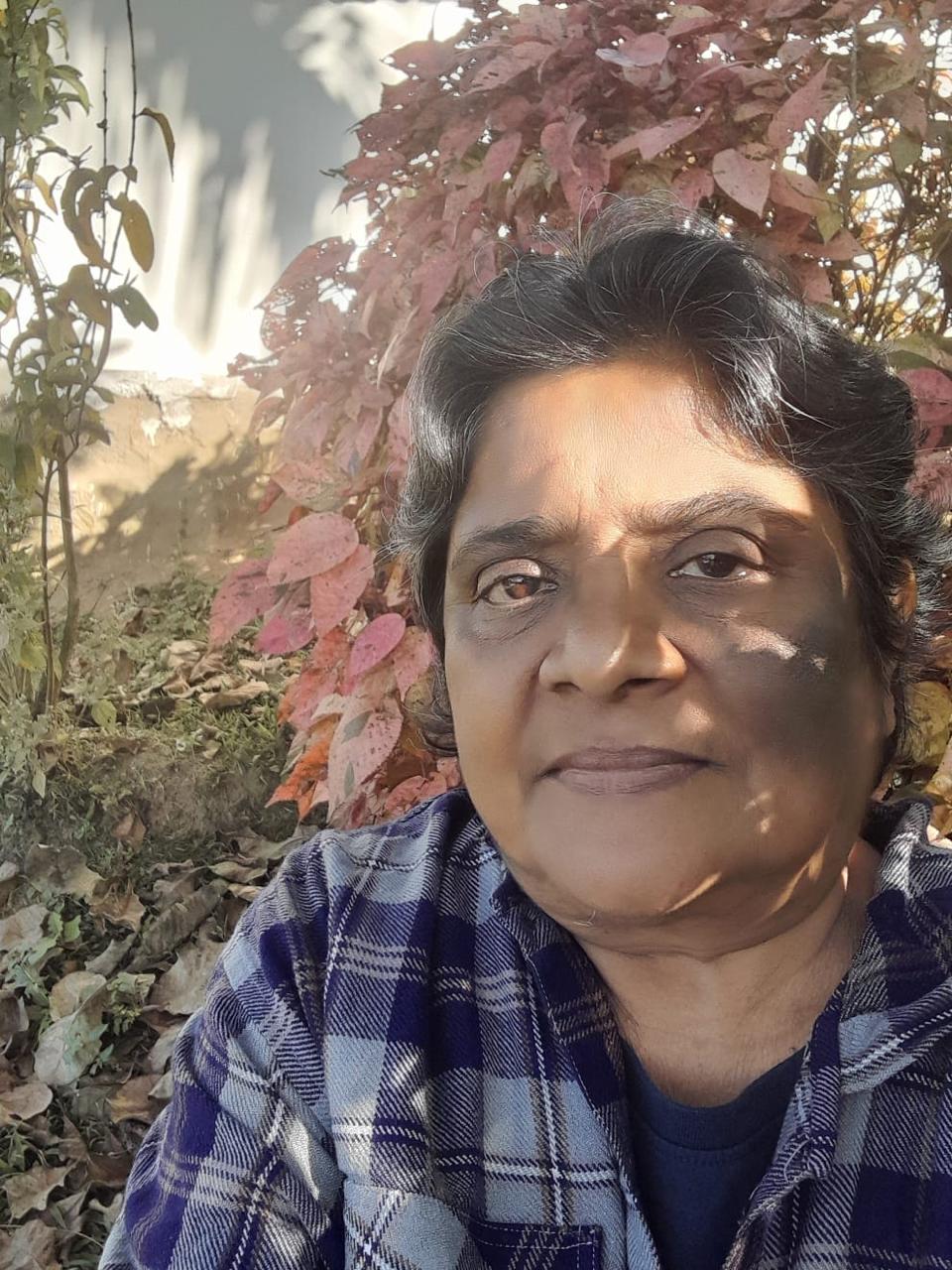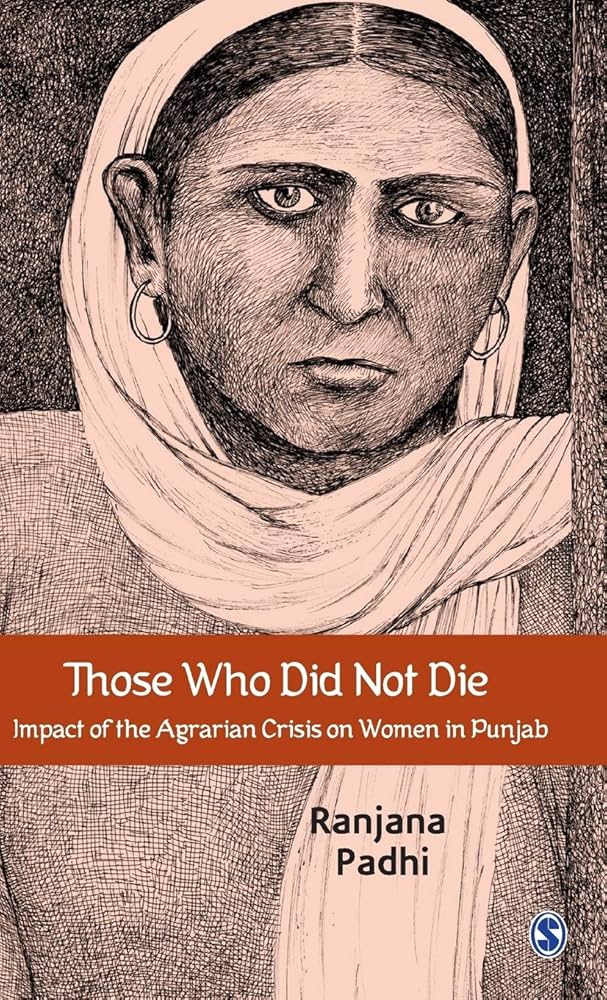Published April 14th, 2025
Interview
by Preeti Kathuria
Born in Berhampur, Orissa, eastern India, Ranjana Padhi is a political activist, author, and editor. She has been involved in autonomous collectives spanning over 20 years in Saheli Women’s Resource Centre while also active in workers’, civil and democratic rights issues. In the bid to make sense of the rapidly changing ground realities and to move the intensity across diverse realms of inquiry, she authored Those Who Did Not Die: Impact of the Agrarian Crisis on Women in Punjab (Sage, 2012) and co-authored Resisting Dispossession: The Odisha Story (Palgrave, 2020).
Preeti Kathuria: How did you get inclined towards writing on social issues? Was it right from childhood or later in life?
Ranjana Padhi: I have been passionate about books since childhood. I was sent to Delhi for higher studies where I pursued my passion for literature. I was committed to the student’s union, often assuming leadership roles. At that time, many events left an indelible mark: Delhi genocide of 1984, Bhopal Gas Tragedy, the rise of the autonomous women’s movement. Working with groups outside the small but intense world of college politics was the beginning. As students, we were drawn into marches with thousands of women protesting against dowry, dowry deaths, rape and “sati.” The denial of basic sustenance to Muslim Women or diverse personal laws based on religion exposed us to the fragile plight of women within the family and unrecognised hard labour in running the house and raising children. Working in Saheli, doing joint campaigns, I saw working class habitats and industrial areas of Delhi seething with unrest. Activist work necessitates thinking deeply as a collective. Introspection often led to despair that our hard work was at best healing wounds or defending hard won rights that were being snatched away by the diktats of power. We wrote newsletters, placards, slogans, fact finding reports, which were collective expressions and real-time interventions. In that culture of collective work, I never paused to think who I am individually or had any individual desires to be a writer. Both convictions and work were one in the collective of unions, combined strength, vision filled with hope, and immense pride in collective writing; that satisfaction cannot ever be substituted by individual writing.

Preeti: You hinted at intense struggles and seriousness of fighting against high-brow political gravitas, without attributing a need for individual significance. Do you feel that your work, collectively or individually, makes seriousness desirable? What are the risks?
Ranjana: Yes, feminism questions family and what transpires within the four walls of a house; it is conveniently overlooked in visions of democratic revolution although Engels wrote about it long ago. In the leftist structure, women’s participation and mobilization is glorified. Marxism is not the legacy of the male alone; feminists have contributed to the Marxist inquiry and enriched it. In India, entering debates that questioned institutions of marriage, family, caste, and religion in a class divided society needed much churning. For example, the struggle of the dalits is harsh, given the feudal ethos of society. Yes, there is risk of alienating comrades as the fervour of left politics still rests theoretically on upholding the role played by the working class alone. We see material relations swiftly changing and newer groups of people getting disenfranchised, but changes in ground realities do not inform political practice with ease. There is yet another risk in individual writing, you begin to imagine your ideas or analysis as superior. We are products of our times. Capitalism is far more powerful than representing only corporations or extracting surplus value; it promotes individualism in society. I am wary of becoming individualistic or cynical. So, certainly, seriousness is the order of the day. Autonomous politics, when not compromised, provides the needed impetus. One is neither hindered by “party line” nor has the compulsion of pruning realities into “project proposals.” Writing helps to hold up the mirror.
Preeti: Do you have a thinking language? In which language do you feel comfortable articulating your sequence of thoughts?
Ranjana: Since my political jargon is more developed in Hindi because of the long years spent in North India, I often think in Hindi too. Odia instinctively governs my subconscious. I speak Odia in my sleep, when hungry, when I gush over a newborn infant or when I marvel at nature. I have never been able to figure out if there is a language in which you dream. Do concepts have any language? Writing rests upon abstract thinking. Abstractions have no language, do they? Even if I am writing testimonies and voices of people, it’s no mere quote–unquote exercise. So much thinking goes into writing about lived experiences of ordinary people. Truly, it’s the content that engages me and my pen flows. It’s important for me to “visualize” the structure, then I am able to write easily because of my training in grammar, punctuation, syntax. Writing is resistance. Writing in English revs up my spirit of defiance to bring forth the lived realities. However, translations of my writing into Hindi or Odia sound more authentic and robust because these are languages of people here. My primary impulse lies in connecting dots between contending realities, between theory and praxis. Writing has become a medium of healing and making sense of the world around me. In writing, I only depict and join the dots. The sense of urgency within oneself is quietened and inner demons are laid to rest.
Preeti: There is a controlled abundance in your writing. How easy or difficult is the process of selection and inclusion in your books? I am specifically referring to the case studies in your book Those Who Did Not Die — was the challenge equivalent to, in your words, “reaching for half the sky?”

Ranjana: Good question, this is a common dilemma in the activist genre of writing. For me, keeping the reader in mind works almost like a compass. It is not only festering sorrows and recall of painful memories that form the basis of the book, the same testimonies demonstrate the resilience and hard labour of women in surviving the agrarian crisis. Suicides are a very poignant symptom, I agree. In the aftermath of a suicide, making ends meet to run a family becomes well-nigh impossible for small peasantry and the landless. I was negotiating my way to reach out to both the women's movement and the peasant movement that these women are not merely victims. Feminist praxis equips us with seeing women’s situation both in its specifics and its universal manifestation. Both are important. I had a structured questionnaire that I — along with inputs from peasant unions — designed with much care and thought. I used testimonies as they represent the truth and simultaneously challenge the dominant truth; they serve as “evidence” and evoke action. They bear witness to what metonymically has been experienced by many other women in the same plight, maybe in other states too. All this needed handling the material from the field very closely to capture the individual and collective in the agrarian crisis. But I did not have to give up anything to make other things fit in. Conversations outside the scope of the questionnaire acted like glue and also the ambience, tones and images. The experiential abundance got absorbed in many invisible ways.
Preeti: In your book Those Who Did Not Die, you mention that it is beyond the scope of the study to critically assess what constitutes a crisis in agriculture. After over a decade of writing this book, how do you feel about the crisis today?
Ranjana: In order to bring out the social and psychological impact of the agrarian crisis, I had to lay the ground as to what constitutes an agrarian crisis as available in research and literature, and state what is missing. What had been missing in writings about the agrarian crisis was the plight of those who are surviving the scourge of peasant suicide (women, the youth, the elderly, the children) within the house or the community. What was also missing was that they are still into agriculture, holding up the family, the community, and they have dreams for the future like you or me. The agrarian crisis has deepened, and resistance has also grown. This is well depicted in The Journey of the Farmers’ Rebellion (Iskra Books, 2025) that comrades, friends compiled to show multi-dimensional aspects of the farmers’ struggle to repeal the three laws passed in Parliament in 2020 under the NDA-led government. There are interviews of women, landless labourers and landless farmers. You get to know the impact of the agrarian crisis from the vantage point of those marginalised within the agrarian community.
Preeti: Tell us about your second book Resisting Dispossession: The Odisha Story in the context of dispossession struggles, deepening capitalist assault and the neoliberal agenda.
Ranjana: With the rolling out of the neo-liberal reforms, I found myself more preoccupied with the assault on workers’ rights, the collapse of agriculture and the ushering in of mining operations in east India that is alienating people from their productive assets — be it forests, trees, hills, land or even betel leaves. This turn of the economy impacts subsistence producers the most: marginal farmers, landless, forest dwellers, etc. I was restless to put my ear to the ground and know how communities are surviving these corporate assaults; that too in the name of development. Working on Resisting Dispossession, co-authored with Nigamananda Sadangi, was fulfilling. It is a set of political narratives on how the prevailing development paradigm has met with people’s resistance in Odisha. It was like weaving a narrative from the vantage point of those who take pride in their rootedness and brave the capitalist onslaught.
Nationality: Indian
First Language(s): Hindi
Second Language(s):
English
Supported by:


Comments on "Thick Descriptions: Articulating Human Contestation of the Crisis — In-Conversation with Author Ranjana Padhi"
Please log in to submit a comment.
Login